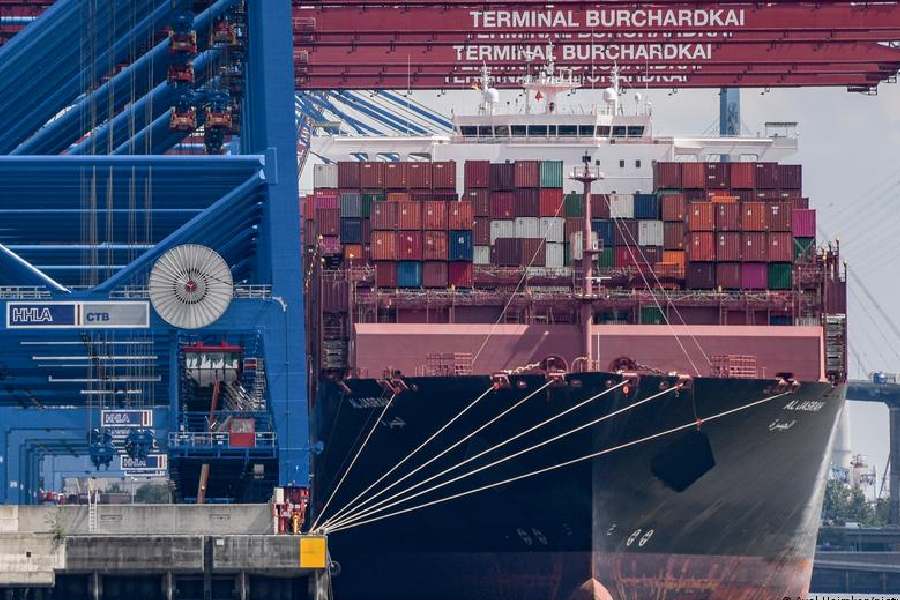Over the past week, most of the world's largest shipping firms have said they will avoid the Red Sea and, therefore, the Suez Canal after Yemen-based Houthi rebels fired missiles at cargo ships over the Israel-Hamas war.
Instead, ships traveling from the Far East to Europe will need to make a detour around the entire African continent via South Africa's Cape of Good Hope. The journey will take more than a week longer and will add about 3,500 nautical miles (6,482 kilometers).
The Suez Canal, which connects the Red Sea to the Mediterranean, is the shortest route between Europe and Asia. About 12% of global shipping traffic normally transits the waterway.
Costs for shipping firms skyrocket
The decision already greatly impacts the cost of shipping goods, say industry analysts. If it becomes an extended crisis, it could spark a hike in the price consumers pay for imported goods.
"Take one round-trip voyage from Shanghai to Rotterdam, and you add a million dollars in fuel costs from rerouting via the Cape of Good Hope," Peter Sand, chief analyst at the Copenhagen-based market analytics firm Xeneta, told DW. "So that alone is a huge bill."
Insurance premiums have soared in response to the attacks, while container shipping lines that run weekly services between Asia and Europe will need to factor in the cost of three extra ships to ensure a similar level of service, Sand added.
The delays in shipping will then have knock-on effects at container ports across Europe, which are usually highly efficient at handling flows of large numbers of containers.
"Let's say I have a port that handles 50,000 containers per week. But then if nothing arrives for a week, and the following week a hundred thousand containers arrive, that can cause congestion problems," Lars Jenson, CEO of Vespucci Maritime, a Denmark-based shipping industry consultancy, told DW.
The Red Sea crisis has stirred memories of March 2021 when the Suez Canal was blocked for six days after the container ship Ever Given ran aground. At that moment, the world was exiting lockdowns from the COVID-19 pandemic, and huge bottlenecks had already emerged in global trade supply chains.
Hundreds of ships were left in a holding pattern in the Red Sea for weeks, and the cost of shipping a container rose from $2,000 (€1,828) to $14,000. The Ever Given crisis caused months of additional delays to goods imported from Asia.
Supply chains more robust today
Although supply chains have since mostly returned to normal, the security threat in the Red Sea could see prices double over the next few weeks, say analysts. Global freight rates were already rising again after the Panama Canal last month curbed the number of vessels that could ply the waterway that connects the Atlantic and Pacific oceans due to a drought.
Fortunately, the shipping industry has learned the lessons from the post-COVID supply chain crisis, and many firms have expanded their fleet of cargo vessels, meaning the impact of any lasting Red Sea rerouting won't be as disastrous.
"Right now, we have an overcapacity of container vessels, so in the absolute worst case, where we have to continue to go around Africa for a time, we do have the container vessels in the world to do this," Jensen said.
For the first few days of the current crisis, shipping firms had kept their vessels in a holding pattern in the hope that the attacks would be curtailed or security in the region would be quickly increased.
"This week, more and more vessels are being redirected to go around Africa, which seems to indicate the carriers are beginning to lose faith that this crisis can be resolved very rapidly," Jensen added.
US, allies step up naval security
On Tuesday, the United States announced a multi-nation operation to safeguard maritime commerce in the Red Sea. As part of the measure, Britain, Bahrain, Canada, France, Italy, the Netherlands, Norway, Seychelles and Spain will stage joint patrols in the southern Red Sea and the Gulf of Aden.
US and British warships in the area have begun shooting down Houthi missiles and drones in recent days. However, it is unclear whether the presence of a larger naval force will be enough to halt the attacks altogether.
Some ships are, however, continuing to ply the Red Sea, albeit with armed guards on board, in case their vessels are boarded by Houthi rebels, who insisted Tuesday that the US-led security operation would not deter them.
"[With Ever Given] it was easy to see that it would soon be resolved. This is more tricky because what is it going to take to get the Houthis to stop launching missiles and drones at the ships, especially as they are drawing attention to the [Israel-Hamas] conflict?" Jensen told DW.
Shipment delays won't affect Christmas shopping, but there is the potential for stores to run low on stock by February if the delays continue, supply chain research firm Project44 said in a note on Tuesday.
Other analysts have warned that while container shipping may be hit harder overall, the delay to vessels carrying fossil fuels to Europe may be felt first.
"We see energy shipments being impacted right here, right now — whether that's oil or coal or gas — simply due to winter in the northern hemisphere," Sand told DW. This could lead to a knock-on effect on energy prices.











